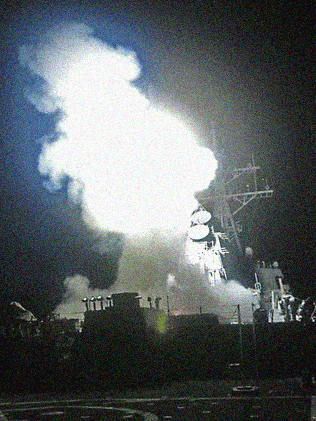 (Pictured: Tomahawk missile launched at Gaddafi’s forces.)
(Pictured: Tomahawk missile launched at Gaddafi’s forces.)
“Broadening our military mission to include regime change would be a mistake,” said President Obama on Monday, addressing the National Defense University in Washington, DC. Instead of a policy of regime change, the United State will stick to “the task that I assigned our forces – to protect the Libyan people from immediate danger.”
That is all well and good, except that the immediate danger is the rule of Muammar Gaddafi (“Gaddafi has not yet stepped down from power, and until he does, Libya will remain dangerous”) and the means by which we are we protecting the Libyan people are military attacks against Gaddafi’s forces (“We struck regime forces approaching Benghazi to save that city and the people within it. We hit Gaddafi’s troops in neighboring Ajdabiya, allowing the opposition to drive them out. We hit Gaddafi’s air defenses, which paved the way for a no-fly zone. We targeted tanks and military assets that had been choking off towns and cities, and we cut off much of their source of supply”).
So, what we’re not doing is regime change. What we are doing is making war on Qaddafi’s forces until he has been deposed from power. I leave it to the good judgment of the reader whether these are distinct concepts.
There’s nothing new in presidents lying about military missions to make them more palatable to the voting public, so Obama’s characterization of the Libyan action is not of paramount importance or even interest. But the fact of regime change really is, and it carries damaging implications for American diplomatic prospects in Iran and other countries going forward.
The problem is this: if Gaddafi can relinquish his weapons program and stop supporting international terrorism and still be targeted for regime change, no other country has any incentive to do either of those things. The mission in Libya is a rod that the State Department has crafted for its own back.
“The oldest test in diplomacy is simply this,” Christopher Hitchens puts it, “Who are your friends? Who are your enemies? Do they know that they are? And is it more dangerous to be your friend than your enemy or is it more dangerous to be your enemy than your friend? Are your enemies apprehensive? Are your friends rewarded?”
Well, no one crowed more loudly than Hitchens himself when, apparently out of Iraq-inspired fear of US invasion, Gaddafi surrendered his illegal weapons. And the negotiators who spearheaded the effort to extract contrition from Gaddafi over Lockerbie were furnished with no small amount of hagiography. And yet, neither of these efforts disqualified Gaddafi as a recipient of violent deposition.
Hitchens, in accusing Ahmadinejad’s Iran of “staking what looks like its entire credibility on negating the concept of non-proliferation,” notes that Iran’s weapons program “must mean a lot to them because they could certainly get a great deal of aid, acceptance, trade, prosperity, stability, if they would give up the idea of their own nuclear device.”
He makes a similar point on Iran’s proxy party in Gaza, Hamas, which retains as part of its manifesto the discredited piece of fascist propaganda, The Protocols of the Elders of Zion. Hitchens recommends we demand that Hamas abandon this: “You can say, ‘Will you do that or won’t you? Because if you won’t, it must mean a lot to you, given what you could get by repudiating it.’”
Well, in order for these overtures to carry any weight at all, the U.S. has to ensure that rogue and unsavory parties willing to change course really do stand to gain. The bombs falling on Libya today argue to the contrary.
Samantha Power and Paul Wolfowitz and their ilk will tell us that Libya’s about-face on weapons and terrorism were good for what they were and produced a certain ease of tensions with the US, but Gaddafi’s brutality against the Libyan revolutionaries demanded a response like the inspiringly-named Operation Odyssey Dawn. (Wait: did I just lump liberal interventionists in with neocons? Yes.)
But it is not as though Gaddafi engineered a violent crackdown on peaceful protestors (which is happening in U.S.-backed Bahrain and Yemen, not apparently to Ms. Powers and Mr. Wolfowitz’s consternation); the protestors in Libya were tribal rebels, amassing guns to go and kill Gaddafi and his cohorts. As splendid as it would have been if they’d succeeded (the more painful, the more splendid), there is no meaningful charge that Gaddafi’s response to the looming revolution should have been non-violent, and no reasonable person could have expected as much.
These optics are bad for the US. It looks as though America has had it in for Gaddafi all along, and no action of his could have had any effect. Even if the optics are deceptive, it’s perception that matters when our diplomats sit down opposite hostile powers elsewhere in the world, not least in Tehran.
Or does Obama think we’ve exhausted diplomacy with Iran?
J.A. Myerson, Executive Editor of the Busy Signal, is the Artistic Director of Full of Noises and a teaching artist with Urban Arts Partnership. He writes primarily on American Politics and Human Rights. Follow him on Twitter.
